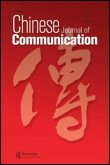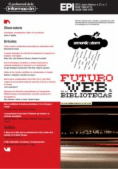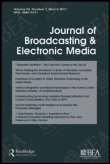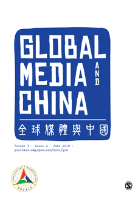
Global Media Journal-Canadian Edition
Scope & Guideline
Innovating Communication Studies for a Global Audience.
Introduction
Aims and Scopes
- Cultural Representation and Identity:
The journal critically examines how various cultures and identities are represented in media, particularly through lenses of race, gender, and nationality. It focuses on the impact of these representations on societal perceptions and individual identities. - Food and Media Interactions:
A significant area of exploration involves the relationship between food, culture, and media, analyzing how food narratives shape identities and social interactions in both local and global contexts. - Political Communication and Misinformation:
The journal addresses the role of media in political discourse, particularly concerning misinformation, disinformation, and the implications of digital media on public perception and political activism. - Memory and Memorialization:
The exploration of public memory, monuments, and memorialization practices in relation to historical and contemporary injustices is a core theme, highlighting how these practices influence collective memory and identity. - Cinematic Studies and Cultural Critique:
The journal also engages with film studies, particularly focusing on Bollywood and its socio-political implications, exploring themes of nationalism, gender, and cultural narratives within cinematic representations.
Trending and Emerging
- Intersectionality in Media Studies:
There is an increasing focus on intersectionality, exploring how overlapping identities and social categories (such as race, gender, and class) influence media representation and audience reception. - Digital Activism and Social Movements:
The journal has seen a rise in discussions around digital activism, particularly related to social movements, reflecting a growing interest in how social media platforms facilitate political engagement and community organizing. - Environmental and Ecological Narratives:
Emerging themes related to environmental issues, particularly in the context of media representation and activism, highlight the importance of addressing ecological concerns in contemporary media discourse. - Food Politics and Cultural Narratives:
The exploration of food as a cultural and political narrative is trending, with increasing attention to how food practices intersect with identity, power, and social justice. - Racial Justice and Media Representation:
A significant increase in publications addressing racial justice and the representation of marginalized communities in media reflects a broader societal push for equity and justice.
Declining or Waning
- Traditional Media Analysis:
There has been a noticeable decline in the analysis of traditional media forms, such as television and print journalism, as the focus has increasingly shifted towards digital media and its implications. - Globalization and Media:
Although globalization remains a relevant theme, specific discussions around its impacts on media have waned, possibly due to a growing emphasis on localized narratives and experiences. - Historical Media Studies:
Research that solely focuses on historical contexts of media without connecting to contemporary issues has seen a decline, suggesting a preference for studies that bridge past and present narratives.
Similar Journals

Chinese Journal of Communication
Advancing Understanding of Chinese Media in a Global ContextThe Chinese Journal of Communication, published by Routledge Journals, Taylor & Francis Ltd, has established itself as a pivotal platform for scholarly discourse in the field of communication, particularly within the context of Chinese media and its global interactions. With a notable Q1 ranking in the 2023 Communication category and a commendable Scopus ranking of #77 out of 511 journals, it represents a significant contributor to the advancement of communication studies. The journal's focus extends from theoretical frameworks to empirical research, fostering a comprehensive understanding of the evolving communication landscape. Available in both print (ISSN: 1754-4750) and digital formats (E-ISSN: 1754-4769), the journal does not operate on an Open Access basis, yet it remains a highly sought-after resource for researchers, professionals, and students aiming to explore communication phenomena from a Chinese perspective. Given its publication history converging from 2010 to 2024, it serves as a valuable reference point for ongoing academic investigations and is instrumental in shaping future research directions in this dynamic field.

Tripodos
Advancing Knowledge in Communication StudiesTripodos is a prominent open-access journal published by UNIV RAMON LLULL, FAC CIENCIES COMUNICACIO BLANQUERNA in Spain, dedicated to advancing the field of communication studies since its establishment. With an ISSN of 1138-3305 and an E-ISSN of 2340-5007, Tripodos has gained recognition for publishing high-quality research articles that examine diverse aspects of communication in contemporary society. The journal has successfully transitioned to open access since 2006, ensuring that its valuable contributions are readily available to a global audience. As of 2023, Tripodos holds a Q3 ranking in the Communication category according to Scopus, reflecting its growing influence within the academic community, ranking 187 out of 511 journals and positioning itself in the 63rd percentile. This journal serves as an essential platform for researchers, professionals, and students who are eager to explore the dynamic field of communication and its impact on society.

Profesional de la Informacion
Catalyzing Discussion on Contemporary Communication ChallengesProfesional de la Informacion is a leading academic journal dedicated to advancing research in the fields of Communication, Cultural Studies, Information Systems, and Library and Information Sciences. Published by EDICIONES PROFESIONALES INFORMACION SL-EPI, this journal has established itself as a pivotal resource for scholars and practitioners alike since its inception in 2006, holding an impressive Q1 ranking across its categories in 2023. With an impactful presence reflected in its Scopus Rankings—33rd out of 511 in Communication and 26th out of 280 in Library and Information Sciences—Profesional de la Informacion provides a forum for innovative research and discussion. Although it operates under a subscription model, the journal’s commitment to quality research contributes significantly to the knowledge base within its fields, making it an essential read for those who are passionate about information and communication studies. Positioned in the vibrant academic landscape of Barcelona, Spain, this journal encourages submissions that explore contemporary challenges and advancements in these vital areas of study, solidifying its role as a cornerstone of scholarly discourse.

International Journal of Communication
Connecting scholars and practitioners in communication.International Journal of Communication, published by USC Annenberg Press, is a premier open access journal dedicated to advancing the field of communication studies. Since its inception in 2007, the journal has provided a vital platform for researchers, professionals, and students to engage with cutting-edge research, theoretical frameworks, and empirical studies. With an impressive Q1 quartile ranking in Communication for 2023 and a notable Scopus rank of 156 out of 511 in the Social Sciences Communication category, the journal consistently contributes to high-quality scholarly discourse. It covers a wide array of topics, making it a crucial resource for those looking to stay informed about the latest developments in communication research. The journal's commitment to open access enhances its reach and impact, fostering a global community of academics and practitioners dedicated to exploring the complexities of communication in contemporary society. This makes the International Journal of Communication an essential read for anyone interested in understanding the dynamics of communication today.

Communication & Society-Spain
Advancing Communication Research for a Dynamic SocietyCommunication & Society-Spain, published by Universidad de Navarra, is an esteemed open access journal dedicated to advancing scholarship in the dynamic fields of communication and cultural studies. Since its inception in 1988, the journal has maintained a commitment to disseminating high-quality research that engages with contemporary issues and contributes to the evolving discourse around communication theories and practices. With a commendable Q1 ranking in both Communication and Cultural Studies categories, it stands as a prominent source for researchers and professionals alike, reflecting its robust presence in the academic community—evidenced by its Scopus rankings placing it in the top percentiles within both fields. The journal's scope encompasses diverse perspectives and methodologies, thereby fostering interdisciplinary dialogue essential for understanding the complexities of communication in society. With a publication history that spans from 2010 to 2024 and a ranking of #87 out of 1304 in Cultural Studies, our commitment to open access ensures that impactful research is readily available to all, promoting further scholarly engagement and innovation.

Media & Jornalismo
Illuminating the Future of Journalism through Rigorous Scholarship.Media & Jornalismo is a leading journal in the fields of Communication and Cultural Studies, published by COIMBRA UNIV PRESS. With its strong commitment to open access since 2015, it serves as an essential platform for researchers, professionals, and students eager to explore contemporary media dynamics, cultural phenomena, and the evolving landscape of journalistic practices. Based in Portugal, this journal boasts a notable ranking in the Scopus database, positioning itself within the 31st and 61st percentiles for Communication and Cultural Studies, respectively. Its rigorous peer-reviewed articles contribute significantly to the academic discourse, making it a vital resource for anyone interested in media research. The journal's convergence from 2018 to 2024 promises to further enrich its content, fostering innovative scholarship in an increasingly interconnected world. Discover more at Media & Jornalismo.

JOURNAL OF BROADCASTING & ELECTRONIC MEDIA
Connecting Research and Practice in BroadcastingThe JOURNAL OF BROADCASTING & ELECTRONIC MEDIA, published by Routledge Journals, Taylor & Francis Ltd, is a premier academic publication in the field of communication, officially recognized in the Q1 category for its exceptional quality and impact. With a rich history dating back to 1985, this journal serves as a vital platform for innovative research and critical discussions surrounding broadcasting and electronic media, addressing contemporary issues in digital communication, media technology, and audience studies. The journal boasts an impressive Scopus rank of #73 out of 511 in the Social Sciences - Communication category, placing it within the top 15% of its field. Researchers, professionals, and students alike benefit from its insightful articles that contribute to understanding the evolving landscape of media and communication. Although it does not currently operate under an Open Access model, its rigorous peer-review process ensures that published works meet high academic standards, sustaining its reputation as a cornerstone for scholarly discourse in the media industry.

Comunicacion y Sociedad-Guadalajara
Fostering scholarly dialogue in communication studies.Comunicacion y Sociedad-Guadalajara is a distinguished peer-reviewed journal published by UNIV GUADALAJARA that plays a vital role in the field of communication studies. With an ISSN of 0188-252X and an E-ISSN of 2448-9042, this journal has embraced Open Access since 2023, ensuring that groundbreaking research is accessible to a wider audience. Hailing from Mexico, it serves as a platform for innovative research and critical discourse in communication, ranking Q2 in the Communication category and securing a notable Scopus rank of #[232/511, positioning it within the top 54th percentile of its field. Covering converged years from 2009 to 2010 and from 2013 to 2024, the journal's objective is to foster scholarly dialogue and advance knowledge across diverse aspects of communication. With a commitment to excellence, Comunicacion y Sociedad-Guadalajara stands as an essential resource for researchers, professionals, and students seeking to engage with contemporary issues in communication.

Global Media and China
Connecting Scholars to the Pulse of Global Media in ChinaGlobal Media and China, published by SAGE Publications Ltd, is an esteemed open-access journal dedicated to fostering scholarly dialogue and research in the rapidly evolving dynamics between global media and Chinese communication practices. Launched in 2016, this journal has rapidly ascended within the academic community, achieving a remarkable Q1 ranking in both the Communication and Cultural Studies categories as of 2023, and holding significant positions in the Scopus rankings at the 95th and 81st percentiles respectively. Situated in the United Kingdom, the journal serves as a crucial platform for researchers, professionals, and students seeking to explore the intricate intersections of media influence, cultural policies, and communication trends originating from China. With a clearly defined scope and a commitment to open-access publication, Global Media and China is poised to continue its impactful contribution to global conversations surrounding media studies and cultural contemporary issues through to 2024 and beyond.

Turkiye Iletisim Arastirmalari Dergisi-Turkish Review of Communication Studies
Enhancing Understanding of Contemporary Communication Processes.Turkiye Iletisim Arastirmalari Dergisi, also known as the Turkish Review of Communication Studies, is an esteemed academic journal published by Marmara University, Faculty of Communication. Since its establishment as an Open Access journal in 2000, it has been committed to advancing the field of communication studies, offering a platform for innovative research and discourse in this dynamic discipline. With an ISSN of 2630-6220, the journal seeks to bridge the gap between theory and practice, addressing various sub-disciplines such as media studies, interpersonal communication, and public relations. Situated in the vibrant academic landscape of Istanbul, Turkiye, the journal aims to foster scholarly dialogue among researchers, professionals, and students, contributing significantly to the global communication research community. As it continues to grow in relevance and impact, Turkiye Iletisim Arastirmalari Dergisi plays a vital role in promoting diverse perspectives and enhancing the understanding of communication processes in contemporary society.